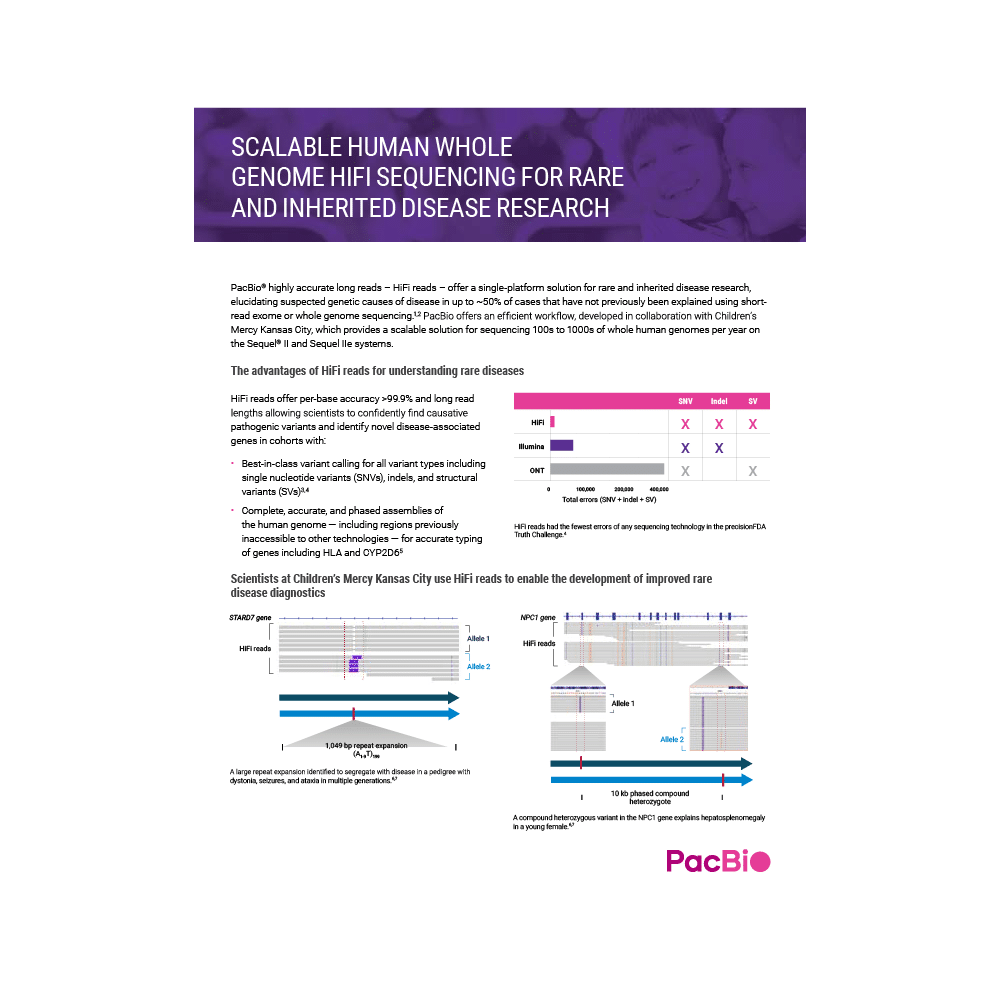Structural variant (SV) detection
Variation between two human genomes, by number of base pairs impacted, single-nucleotide variants (SNVs) are the most numerous variant type (~4–5 M/person) followed by indels. The importance of structural variants and tandem repeats may seem insignificant because there are far fewer. However, because of their size (>50 bp), they account for more genomic variation between individuals than SNVs and indels combined.
Only HiFi sequencing offers accurate, small variant calls while also offering significantly more structural variant (SV) detection.4 Fuller resolution of these variant types enables researchers to better study human genetic diversity and disease association. HiFi sequencing enables researchers to comprehensively study all variation types, better elucidate function, and potentially improve the relatively static solve rates of short-read whole genome sequencing (WGS) and whole exome sequencing (WES).
4. Ebert, P. et al. (2021) Haplotype-resolved diverse human genomes and integrated analysis of structural variation. Science.
Application brief
HiFi sequencing enables greater accuracy of somatic variant calling
High-quality HiFi reads detect a wide range of cancer-specific somatic variation including single nucleotide variants (SNVs), structural variants (SVs), insertions and deletions (indels), copy number variations (CNVs), and methylation in a single assay. HiFi sequencing shows improved somatic variant calling accuracy with less sequencing relative to other technologies.
Workflow
From DNA to comprehensive variant detection
With HiFi reads from the Sequel II or IIe systems, you can comprehensively detect variants in hundreds to thousands of genomes in a year. HiFi reads provide high precision and recall for single nucleotide variants (SNVs), indels, structural variants (SVs), and copy number variants (CNVs), including in difficult-to-map repetitive regions.
Sample preparation
Starting with unamplified genomic DNA, prepare libraries for whole genome sequencing using standardized protocols and workflow recommendations.
- Prepare SMRTbell libraries for HiFi sequencing of up to 16 samples with manual prep for up to 32 HiFi libraries per week by one technician, or 96 samples using this automation-friendly workflow
- Start with unamplified genomic DNA (>5 µg input) from any sample type (blood, tissue, cell lines)
- Enrich for 15–18 kb inserts with size selection. Inserts larger than this range may reduce read and variant calling accuracy
- Explore recommendations for all SMRT sequencing applications
Sequencing
The Sequel IIe system provides affordable HiFi coverage of a genome for comprehensive variant detection on a single platform.
- Use the Sequel II or IIe system and SMRT Cell 8M to sequence to desired coverage depth
- Recommend 2 SMRT Cells 8M to achieve >15-fold coverage of a human genome for comprehensive variant detection*
*Read lengths, reads/data per SMRT Cell 8M, and other sequencing performance results vary based on sample quality/type and insert size.
Data analysis
Detect variants of all types using efficient, full-solution analytical software tools and standard file formats.
- Call structural variants with pbsv, available through the structural variant calling analysis in SMRT Link
- Call small variants with DeepVariant using the PacBio model
- Use joint calling in pbsv and DeepVariant for multiple samples
- Phase variants with WhatsHap
Scalable human whole genome HiFi sequencing for rare and inherited disease research
Explore our efficient and scalable workflow, developed in collaboration with Children’s Mercy Kansas City, for high-throughput sequencing and comprehensive variant detection to better understand the genetic causes of rare and inherited diseases.

